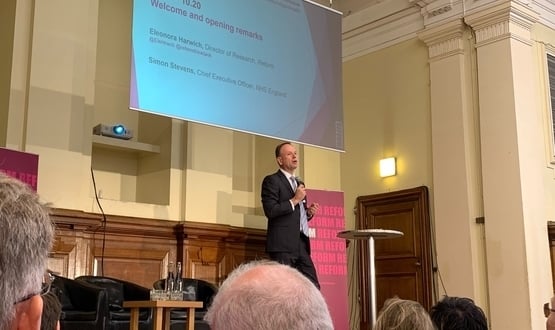NHSE chief exec says data sharing restrictions will enhance safety
- 5 June 2019

The chief executive of NHS England has said that restrictions on trusts sharing data will help to enhance safety.
Speaking at Reform’s ‘Unlocking the promise of digital health’ conference earlier today, Simon Stevens said trusts have been told not to do “individual side agreements” to “ensure data is being used safely”.
The letter, seen by Digital Health News, asks NHS organisations “do not enter into agreements granting third parties exclusive access to the raw data they hold (healthcare or operational)”.
Signed by Simon Eccles, CCIO for Health and Social Care, the letter adds that this request has been made while a policy framework for such agreements is developed.
The letter was sent to trusts on 28 May 2019.
A number of trusts have entered data agreements with private companies.
This includes the Royal Free London NHS Foundation Trust signing a deal with DeepMind and Oxford University Hospitals NHS Foundation Trust, George Eliot Hospital NHS Trust and Wye Valley NHS Trust having a partnership with Sensyne Health.
This new approach has been welcomed by Sir John Bell ,the author of a government life sciences industrial strategy report.
In a piece for The Times, Sir Bell said it meant this encourages trusts, when entering into partnerships, to not limit the sharing of data to one researcher or partner.
At the think tank’s event, Stevens also spoke about a selection of technological innovations which are to be rolled out across the health service.
The new treatments and tests are being delivered as part of the NHS’ Innovation and Technology Payment programme, which is fast-tracking the roll-out of the latest technology across the country.
Gammacore, a hand-held device that delivers mild electrical stimulation which helps to block the pain signals that cause cluster headaches, is one of the innovations being supported by NHS England.
Stevens joked that the device could be “good for Westminster” given the current political climate.
The other innovations which are to receive support from NHS England are:
- Placental growth factor (PIGF) based test – A blood test to help rule out pre-eclampsia in women suspected to have the condition who are between 20 weeks and 34 weeks plus 6 days of gestation, alongside standard clinical assessment.
- High sensitivity troponin test – A blood test that, when combined with clinical judgement, can help rapidly rule-out heart attacks.
- SpaceOAR – A hydrogel injected between the prostate and rectum prior to radiotherapy, that temporarily creates a space between them so that the radiation dose to the rectum can be minimised, reducing complications like rectal pain, bleeding and diarrhoea.
- HeartFlow – Advanced image analysis software that creates a 3D model of the coronary arteries and analyses the impact that blockages have on blood flow to rapidly diagnose patients with suspected coronary artery disease.
The current elephant in the room concerning President Donald Trump and the NHS was also brought up.
During his state visit this week, the US President said the health service should form part of any future trade deals between the United States and the UK – however he later backtracked on this.
When quizzed about the President’s comments, Stevens said he “preferred the second answer to the first”.
He added: “Our choice in this country is clear, we want an NHS and we want it to continue.”





